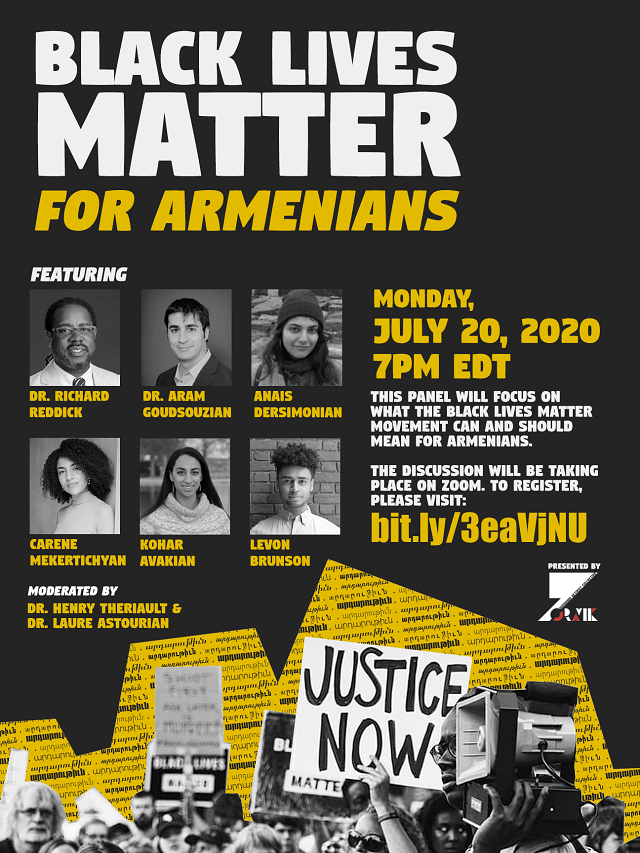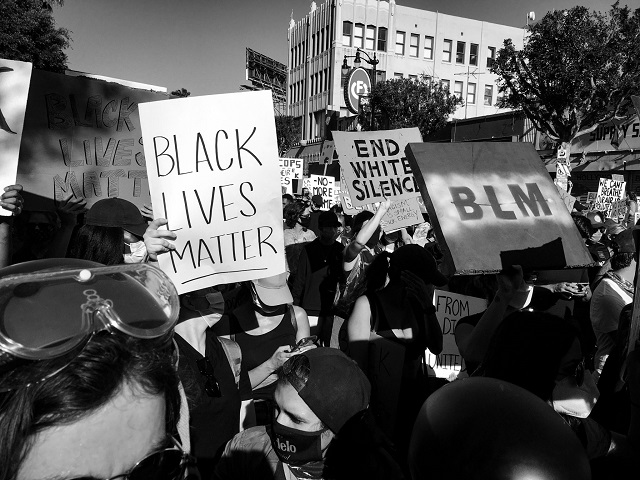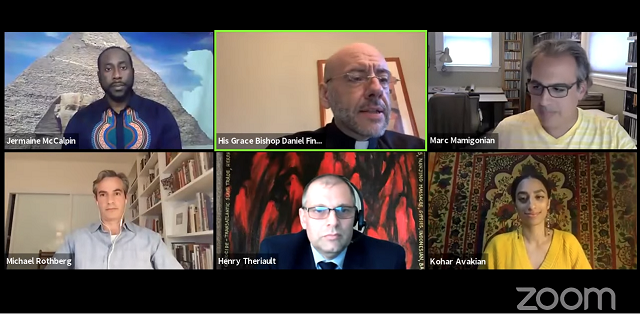The Armenian Weekly. A virtual forum hosted by the progressive Boston-based Armenian activist collective Zoravik explored a shared history of subjugation, violence, exclusion and denial to advise what the Black Lives Matter movement can and should mean for Armenians.
“People will say this conversation…is anti-American, but we are simply holding this nation accountable to its ideals,” said Dr. Richard Reddick of the University of Texas at Austin’s College of Education. Dr. Reddick, who serves as the College of Education’s Associate Dean for Equity, Community Engagement, and Outreach, was a key voice in the online event titled Black Lives Matter for Armenians, which garnered the attention of more than 300 live viewers and has since been widely shared on social media.
The panel was co-moderated by Dr. Henry C. Theriault, Associate Vice President for Academic Affairs at Worcester State University and President of the International Association of Genocide Scholars, and Dr. Laure Astourian, Assistant Professor of French at Bentley University. The panel also included Aram Goudsouzian, Ph.D. (history professor at the University of Memphis), Kohar Avakian (Ph.D. candidate in American Studies at Yale University), Levon Brunson (computer science undergraduate at Brown University), Anaïs DerSimonian (writer and filmmaker) and Carene Mekertichyan (actress, writer, singer and educator). Zoravik member and Harvard University lecturer Lisa Gulesserian, Ph.D also participated.
The panelists addressed a range of themes, including intergroup solidarity, white supremacy, Armenian identity and white privilege.
Read also
Significantly, Mekertichyan addressed the contested question of the relationship between the Armenian community and racism in the US. Mekertichyan, as a Black-identifying Armenian, explained the difference between anti-Black racism and ethnic prejudices experienced by many Armenians. She described the history of racist systems, such as policing, redlining, housing discrimination and the school-to-prison pipeline, put in place by white supremacy to target the Black community that Armenians have never experienced.
“You cannot compare your experience in America to the experience that the Black community has had in this country,” she asserted, addressing the Armenian community. “Saying, why can’t they just do what we do, and this ‘pull yourself up by the bootstraps’ mentality, it’s false and it’s very hurtful and detrimental to the current movement, because we need to be uniting.”
The panelists also discussed the many manifestations of white supremacist ideologies, both in conferring privileges upon the Armenian community and in enacting cultural erasure.
Avakian, who participated in a similar panel late last month, stated that many of the issues facing the Armenian Diaspora may be rooted in white supremacy. She pointed to the damaging psychological impacts of white assimilation on an already traumatized community that immigrated to the United States fleeing assimilationist violence. “We need to ask ourselves the many ways that [whiteness] manifests in such toxic ways in our community, whether it’s colorism, anti-Blackness [or] homophobia,” she suggested.
The panelists agreed that the current moment places an imperative upon Armenians to recognize their privileges and mobilize their resources to center and uplift Black voices.
Mekertichyan suggested sharing space with a Black Lives Matter chapter, participating in protests or donating to local movements. She also recognized that Armenian allyship must be inclusive of those members of the Black community who are struggling the most. “If your activism does not include Black Trans women, then it’s not good activism,” she upheld.
The conversation also revealed the importance of intergroup solidarity. The panelists agreed that the struggles facing the Armenian community do not exempt its members from working to dismantle systems of oppression and supporting others. Rather, the panelists argued that everyone has a stake in ending white supremacy, both because of its ubiquitous harms and because advocating for justice is the morally correct stance.
Brunson, who identifies as Black and Armenian, attested to his passion for fighting on behalf of Black Lives Matter and the Armenian cause simultaneously. “The Armenian Genocide, being as horrible and nefarious and evil as it was, should have prompted people to look past the issues that they were immediately facing and come and help,” he claimed. “Inability to look past one’s own immediate issues and apply attention elsewhere is what breeds and fosters the environment in which genocide can be perpetrated.”
“If your allyship is something based on your desire to get others to show up for you, that’s self-serving, and that isn’t the way that you build real allies, because allyship means action,” Avakian articulated. “It means showing up for others because you genuinely care and because you genuinely feel a passion against the deep injustice that’s happening.” DerSimonian, for her part however, suggested the use of the term “accomplice,” arguing, “When you’re an ally it implies that you are ‘for’ a marginalized group, so you have this sort of savior complex, you are on the sidelines, you are pro-Black Lives Matter, but it’s not really your movement, whereas an accomplice implies ‘with.’ It’s your battle too.”
During viewer questions, the issue reemerged of whether Armenians should divide their attention between the difficulties facing their community and anti-Black racism. One person posed the hypothetical of whether or not Armenians would be more willing to support other causes, like Black Lives Matter, if Turkey recognized the Armenian Genocide.
Dr. Goudsouzian identified that question as a dodge to avoid addressing the central importance of allyship revealed by the forum. “How can we as Armenians, if we claim to identify with oppressed people, if a big part of our identity revolves around this historic oppression, how can we not stand with others?” he asked.
For further information, the audience was directed to armeniansforblacklives.org, a running list of articles and op-eds authored by Armenians about Black Lives Matter and compiled by activists at Zoravik.

























































